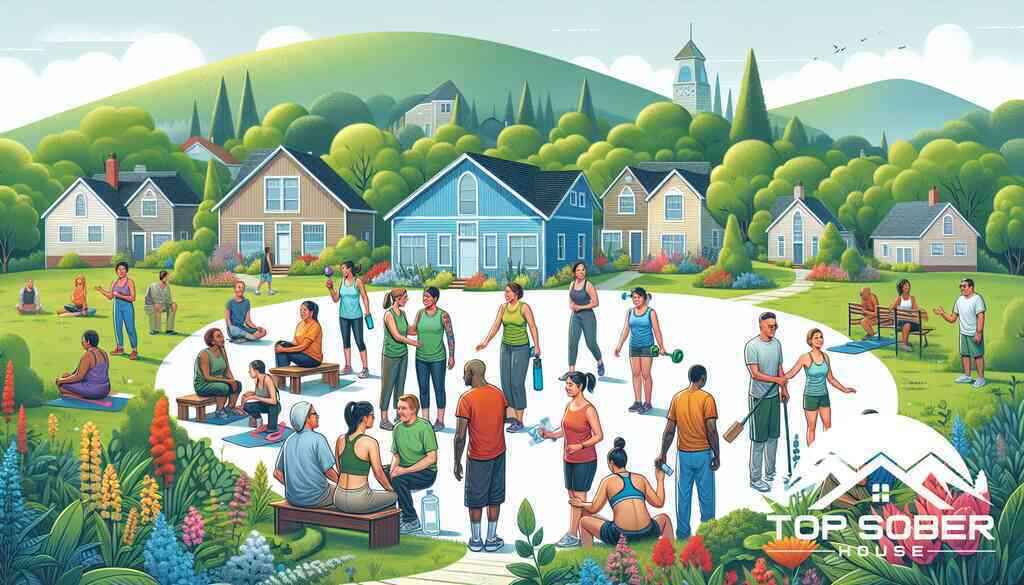
Exploring Top Sober House Success Models in Georgia Now
October 13, 2025
Finding Hope in Community Support
Harnessing the Power of Peer Support in Georgia
Peer support networks play an essential role in the recovery journey, especially within the sphere of Georgia sober living models. By engaging in a community of individuals who share similar experiences, residents gain invaluable insights and encouragement. Such networks are designed to promote accountability and understanding among participants. In Georgia, these peer support systems are increasingly being recognized for their potential to foster a nurturing environment pivotal for addiction recovery. Furthermore, individuals often find solace in shared experiences, enabling them to navigate challenges with more resilience. For more insights, explore the peer support networks in Georgia that cultivate a thriving recovery community.
The Role of Family in Long-Term Sobriety
Family involvement is crucial for individuals looking to maintain long-term sobriety. Families can provide an irreplaceable safety net that bolsters one’s resolve to achieve a substance-free life. Within Georgia’s sober house network, the family is often seen as an adjunctive source of support that integrates seamlessly with formal treatment methods and peer collaborations. Encouragement from loved ones propels recovery efforts, equipping individuals with the emotional and mental fortitude needed to overcome hurdles. By aligning family support with professional addiction recovery frameworks, multiple pathways to sustained sobriety are opened. Learn more about the critical role of family in addiction recovery within Georgia’s sober living environments.
Building a Sober Support Network
Strong support networks are the backbone of successful addiction recovery. They provide vital emotional and practical support, essential during challenging phases of recovery. In Georgia, building an effective sober support network involves integrating friends, family, professional therapists, and peers who understand the intricacies of addiction. Support networks are often bolstered through participation in support groups and community activities, offering constant reinforcement to stay on track through Alcoholics Anonymous meetings. Engaging in such networks ensures that individuals do not face the recovery journey alone. It is a community-centered approach that lays the groundwork for substantial recovery progression and empowerment. For those aiming to construct a supportive framework, building a supportive recovery community is imperative for sustained success in Georgia’s sober living endeavors.
Innovative Sober House Models in Georgia
Unique Approaches to Sober Living in Georgia
Georgia’s sober houses are pioneering unique approaches to foster enduring recovery paths. These models focus on creating engaging environments tailored to the diverse needs of residents. By leveraging innovative sober living models, such homes provide more than just a safe place; they offer a holistic framework for transformation. Whether through integrating comprehensive wellness programs or fostering community-driven initiatives, these unique approaches highlight Georgia’s commitment to redefining sobriety systems. To delve deeper, explore how these innovative sober living models revolutionize the recovery landscape.
Integrating Therapy with Daily Routines
Integrating therapy into daily routines is a transformative aspect of many Georgia sober homes, which ensure that therapy becomes an intrinsic part of everyday life. By weaving therapeutic practices into the fabric of the routine, residents learn to internalize healthy habits that promote recovery. This seamless integration not only strengthens coping mechanisms but also encourages residents to address underlying issues perpetuating addiction. Georgia sober houses often feature onsite therapy sessions, support groups, and various therapeutic activities. These initiatives, including art and music therapy, empower residents to express themselves creatively. For a closer look at this crucial aspect, see how integrating therapy in sober living presents a comprehensive recovery tool.
Tailored Programs for Individual Needs
Recognizing that every individual’s journey to sobriety is unique, many sober homes in Georgia design tailored programs for individual needs. These personalized plans consider an individual’s history, triggers, and personal aspirations. By creating such fine-tuned programs, Georgia sober houses cater to a variety of substance use disorders, offering specific pathways that resonate with individual experiences. Residents receive attention in crafting their recovery strategy, inclusive of diet, exercise, mental health support, and vocational training. This tailored approach not only facilitates successful outcomes but also empowers individuals to take charge of their recovery journey. Gain insights into these powerful addiction recovery programs in Georgia designed to foster long-lasting sobriety.

Overcoming Addiction through Structured Living
Establishing House Rules for a Safe Environment
Establishing house rules is fundamental for maintaining a safe environment in Georgia’s sober living homes. Rules offer structure, which is crucial for individuals overcoming addiction, helping them focus on their recovery journey. By creating clear guidelines, residents foster a respectful and harmonious living space that promotes sobriety. Structured living environments enable individuals to develop self-discipline, vital for avoiding triggers and managing temptations. Each Georgia sober house prioritizes safety and accountability by enforcing regulations that include curfew times, community chores, and abstaining from substances. As individuals adapt to these house rules, they instill a sense of stability that is vital for successful long-term sobriety.
To dive deeper into the necessity of rules in structured living and recovery support, explore the understanding of structured living environments and how they guide individuals toward a drug-free future.
The Impact of Daily Routines on Recovery
Daily routines are pivotal in the recovery processes within Georgia’s sober houses, offering consistency and purpose amidst change. These routines embed healthy habits that counteract previous lifestyle patterns associated with addiction. By adhering to scheduled activities, residents can cultivate time-management skills and minimize idle time, reducing the risk of relapse. Structure lends itself to better psychological well-being, as individuals know what to expect and can prepare mentally for the day’s activities. Incorporating therapy, fitness, and leisure in daily routines creates a holistic recovery framework that supports physical and mental health. Ultimately, these routines become a cornerstone of the sober living experience, equipping residents with the tools needed for lifelong sobriety.
Creating a Supportive Sober Living Environment
Creating a supportive sober living environment is vital in Georgia’s battle against substance use disorders. Such environments nurture personal growth and underscore the power of community in recovery. Constructive interactions between residents foster mutual understanding and camaraderie, which are essential for navigating the challenges of sobriety. Providing access to support groups and recovery resources, Georgia sober homes establish a network of encouragement and resilience. These supportive settings offer a sanctuary where residents can openly discuss their experiences and receive advice, bolstering their determination to remain substance-free. By engaging with drug-free living resources in Georgia, individuals can reinforce their commitment to overcoming addiction while being surrounded by peers and mentors dedicated to similar goals.
Pathways to Recovery Excellence
Success Stories from Georgia’s Sober Homes
Georgia stands as a beacon of hope with its thriving sober living community, epitomized by countless success stories emanating from its sober houses. Individuals from diverse backgrounds embark on their recovery journey, culminating in triumphant tales of transformation. These stories illuminate the profound impact of Georgia’s sobriety models, where residents regain control over their lives, paving a path toward long-term recovery. By drawing inspiration from these recovery success stories in Georgia, newcomers can embrace the possibility of a substance-free future. An environment rich in camaraderie, peer support, and comprehensive treatment programs fosters these success narratives, illustrating how structured living environments in Georgia create a fertile ground for personal growth and sobriety.
Navigating the Recovery Journey with Confidence
Embarking on the recovery journey requires confidence, a quality cultivated within Georgia’s supportive sober houses. Through structured programs, residents learn to tackle challenges head-on, armed with the skills and resilience necessary for success. As individuals navigate their recovery, they are bolstered by tailored support systems addressing their unique needs and circumstances. This proactive approach enhances their capacity to adapt and thrive within sober living environments. The successful navigation of this journey hinges on the synergy between personal determination and community resources. Emphasize the importance of surrounding oneself with a robust network of peers and professionals dedicated to recovery, turning moments of doubt into stepping stones toward a sober and fulfilling life.
The Role of 12-Step Meetings in Georgia’s Sober Houses
12-step programs hold a pivotal role in the recovery framework of Georgia’s sober houses. These meetings offer a structured path to sobriety, underpinned by principles that encourage self-reflection, accountability, and community support. Integrating the Twelve-step program integration within Georgia sober houses ensures that residents have access to tested strategies and ongoing encouragement. Regular participation in these meetings fosters a sense of belonging and shared purpose, vital components for individuals striving to maintain long-term sobriety. Residents engage in collective healing, drawing strength from the shared experiences chronicled in the 12-step journey, making it an indispensable element of Georgia’s recovery infrastructure.
Resources and Guidance on Your Recovery Journey
Top Sober House Directory: A Tool for Recovery
Embarking on a sober living journey in Georgia? Finding the right environment can significantly enhance recovery outcomes. The Georgia sober living homes directory offers a comprehensive guide to connect individuals with ideal sober housing options tailored to their specific needs. This tool streamlines the search process, providing residents with essential information about the best sober homes in the state. By leveraging this directory, you gain access to a network of reputable halfway houses and group homes, rich with peer support and structured living environments designed to promote long-term sobriety. As you embark on this transformative journey, this directory stands as a reliable resource, helping you make informed choices for a successful recovery path.
Leverage Georgia’s Alcohol Treatment Programs
Integrating structured treatment programs with sober living environments is pivotal for sustained sobriety. Georgia’s alcohol treatment offerings are diverse, ranging from inpatient treatment centers to outpatient programs, each designed to address unique recovery needs. By exploring these Georgia alcohol and rehabilitation programs, individuals can customize their recovery plans, benefiting from specialized therapies and comprehensive care. These programs play a crucial role in addressing both the physical and psychological aspects of addiction, ensuring a holistic recovery journey. With professional guidance, residents can navigate the challenges of addiction recovery effectively, fortifying their resolve and paving the way for a brighter future.
Connecting with Georgia’s Sober Living Resources
A thriving recovery journey is supported by robust connections to local recovery resources. Connecting with Georgia’s recovery community extends beyond the confines of sober houses, fostering lasting relationships and support networks pivotal for sustained sobriety. Participation in Alcoholics Anonymous and other support groups provides camaraderie and guidance from individuals with shared experiences. These connections are not just supportive but fundamental, as they contribute to resilience and accountability necessary for overcoming addiction. Discovering Georgia’s abundant recovery community resources not only enriches your personal growth but also empowers you to navigate the path to lifelong sobriety confidently.

Concluding Thoughts: Embracing the Path to Sobriety
Reflecting on the Journey to Drug-Free Living
The journey to drug-free living is an intricate tapestry woven with resilience, courage, and support. In Georgia, sober living environments serve as a cornerstone of recovery. Residents experience significant personal growth, replete with challenges and triumphs. These structured homes foster a transformative journey that enables individuals to break free from the shackles of substance use disorders. As residents reflect on their path, they appreciate the profound impact of peer support, family involvement, and comprehensive recovery strategies, as documented in this reviewing sober house living standards for 2025 near you. Each success story stands as a testament to the sober house success strategies in Georgia, underscoring that recovery is not just a possibility but a potential reality.
Continuing the Quest for a Brighter Sober Future
As individuals continue this transformative quest, the journey is sustained by hope and determination for a brighter sober future. The frameworks established in Georgia’s sober houses, such as structured routines and tailored programs, provide a reliable foundation for enduring sobriety. Residents are encouraged to leverage local resources, including Addiction treatment services in Georgia, to fortify their ongoing recovery efforts. The commitment to sobriety extends beyond the confines of sober homes, thriving through connections with community support systems and therapeutic outlets. In carving out their path to sustained sobriety, individuals embrace a transformative journey characterized by renewed purpose, enriched quality of life, and the steadfast belief in a future unencumbered by addiction. This perpetual quest for a sober future signifies not just a personal victory but a triumph of community and resilience.
Frequently Asked Questions
Question: How do Georgia sober living models incorporate peer support for successful recovery?
Answer: Georgia sober living models are designed to harness the power of community with a strong emphasis on peer support, which is essential for addiction recovery. By engaging with others who have similar experiences, residents of Georgia sober homes can share insights, find encouragement, and foster accountability. Peer support systems contribute significantly to the nurturing environment pivotal for successful sober living, promoting resilience and a sense of belonging. This approach aligns well with Georgia’s broader recovery community, offering a robust support system backed by shared experiences and mutual understanding to aid in long-term sobriety.
Question: What role does family play in the success of Georgia sober house programs?
Answer: Family involvement is crucial to the success of Georgia sober house programs. Families provide a supportive safety net that complements formal treatment methods and peer support. Encouragement and understanding from family members can significantly bolster an individual’s resolve to maintain long-term sobriety. Georgia sober houses often integrate family support as part of their recovery strategies, offering a more comprehensive approach to overcoming addiction. This combined effort empowers residents by enhancing mental and emotional strength, paving the way for successful and sustained addiction recovery.
Question: How do the innovative sober house models discussed in ‘Exploring Top Sober House Success Models in Georgia Now’ promote long-term sobriety?
Answer: The blog post on ‘Exploring Top Sober House Success Models in Georgia Now’ highlights innovative approaches used in Georgia to foster enduring paths to sobriety. These models focus on more than just providing safe housing – they include unique frameworks such as integrating wellness programs and community-driven initiatives that cater to the diverse needs of residents. By embedding therapeutic activities and regular onsite sessions, residents learn to develop healthy coping mechanisms. Such holistic methods are at the forefront of Georgia’s commitment to redefining sobriety systems, making sober living environments not only a residence but a transformation journey towards long-term sobriety.
Question: Can you elaborate on the importance of structured daily routines in Georgia sober homes?
Answer: Structured daily routines play a pivotal role in the recovery framework of Georgia sober homes by providing consistency and purpose. These routines integrate positive habits, reducing idle time that might lead to relapse and imparting time management skills essential for sober living. Regular schedules encompassing therapeutic practices, exercise, and leisure activities create a balanced recovery environment. Such a structure fosters psychological well-being by offering predictability and stability, empowering residents with the tools needed to maintain lifelong sobriety. At Georgia’s sober homes, these routines are foundational to instilling a sense of accomplishment and aiding in the journey towards drug-free living.
Question: What resources are available for those considering sober living in Georgia?
Answer: For those considering sober living in Georgia, a wealth of resources is available to support their recovery journey. The Georgia sober living homes directory provides a comprehensive guide to connecting individuals with ideal sober housing options tailored to their recovery needs. This directory streamlines the search process, offering connections to reputable halfway houses and group homes designed for sustainable sobriety. Additionally, Georgia’s alcohol treatment programs offer both inpatient and outpatient options to address various aspects of addiction, ensuring a holistic recovery journey. By leveraging these resources, individuals can make informed choices and lay a solid foundation for a successful path towards sobriety and well-being.


